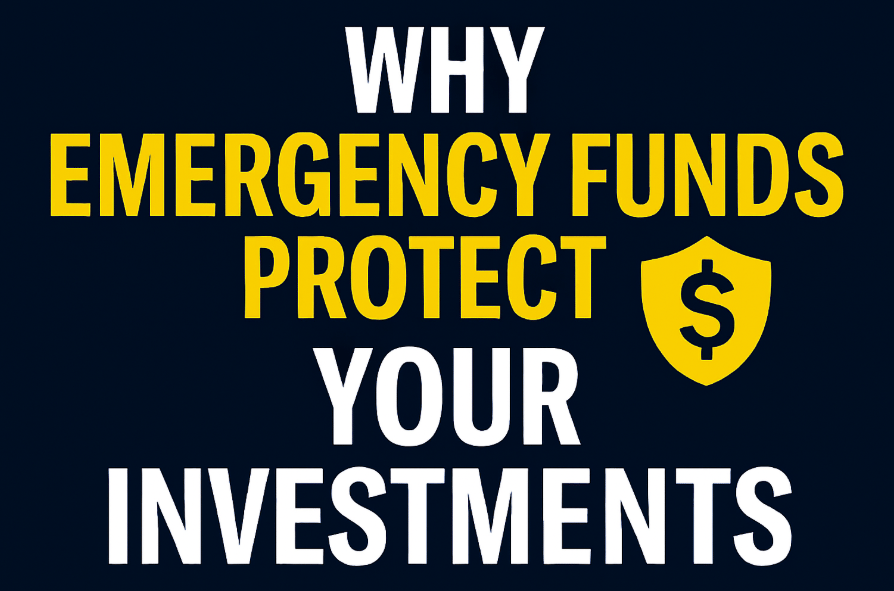- Live Life Grow Wealth
- Posts
- 🛡 Series 4 Day 5: Why Emergency Funds Protect Your Investments
🛡 Series 4 Day 5: Why Emergency Funds Protect Your Investments

Today’s Headline
🛡 Series 4: Risk Management & Protecting Your Wealth
Day 5: Why Emergency Funds Protect Your Investments
Let me ask you a question — if your car broke down tomorrow, or if you suddenly lost your job, what would you do?
Would you sell your investments to pay the bills? Or would you have cash ready to handle it calmly?
This is exactly why an emergency fund is one of the most powerful shields in personal finance. It’s not exciting. It doesn’t double overnight like a lucky stock pick. But it’s the quiet hero that keeps your financial life stable — and your investment plan safe — when life throws surprises your way.
Today, I want to show you how having an emergency fund can protect your investments and help you stay in the game long enough to build real wealth.
“Discover the Email Tactics Behind 7-8 Figure Launches — Before Anyone Else Does”
Become an email marketing GURU.
Join us for the world’s largest FREE & VIRTUAL email marketing conference.
Two full days of email marketing tips & trends, famous keynote speakers (Nicole Kidman!), DJ’s, dance contests & networking opportunities.
Here are the details:
100% Free
25,000+ Marketers
November 6th & 7th
Don’t miss out! Spots are LIMITED!
I want in! (US attendees only!)
💰 What Is an Emergency Fund?
Simply put, an emergency fund is a pool of money you set aside to cover unexpected expenses or sudden loss of income.
Think of it as your financial safety net. It’s there so you don’t have to borrow money or sell your investments when life gets messy — and trust me, it will, eventually.
Common emergencies include:
Losing your job
Medical emergencies
Major home repairs
Car breakdowns
Family emergencies
These aren’t “what if” scenarios — they’re “when” scenarios. No one plans for them, but they happen to everyone.
🧱 The Real Purpose Behind an Emergency Fund
Many people think an emergency fund is just “extra cash sitting around.” But it’s so much more than that.
It serves three key purposes:
Protects You From Panic Selling
When an emergency happens and you need cash, the last thing you want is to sell your stocks at a bad time. Your emergency fund keeps your investments untouched.Gives You Peace of Mind
It’s easier to take long-term investing decisions when you know you’re financially secure. You don’t have to check your stock prices every hour.Prevents Debt
Without an emergency fund, you might turn to credit cards or loans. And that debt can snowball fast.
In short — your emergency fund isn’t just money. It’s freedom. It buys you time to make better choices.
⚠️ The Dangerous Mistake Many Investors Make
I’ve seen this mistake over and over again: people jump straight into investing before building an emergency fund.
They say things like,
“Why keep cash sitting there when I can make it grow in the market?”
It sounds smart — until something unexpected happens.
When life hits, these investors are forced to withdraw their investments at the worst possible time. Imagine selling your stocks during a market crash just to pay rent. You’d lock in your losses, miss the rebound, and set your wealth-building journey back by years.
That’s why I always say: your emergency fund protects your ability to stay invested.
🧠 Think of It Like an Insurance for Your Investments
If you own a car, you buy insurance. Not because you expect to crash tomorrow, but because you might.
Your emergency fund works the same way. It’s financial insurance that prevents a temporary problem from becoming a long-term setback.
And just like insurance, you hope you never have to use it — but you’ll be grateful it’s there when you need it.
🪙 How Much Should You Save in an Emergency Fund?
There’s no one-size-fits-all answer, but here’s a general guide:
If you’re employed: Save at least 3 to 6 months of living expenses.
If you’re self-employed or in a volatile job: Aim for 6 to 12 months of expenses.
When I say “living expenses,” I mean essentials:
Rent or mortgage
Utilities
Groceries
Transportation
Insurance
Minimum debt payments
You don’t need to include luxuries like vacations or gadgets — just the basics that keep your life running.
💡 A Simple Way to Calculate It
Let’s say your monthly expenses are $2,000.
For a 3-month emergency fund → Save $6,000.
For a 6-month emergency fund → Save $12,000.
Start small if needed. Even saving $1,000 can make a huge difference when something unexpected happens. The goal is progress, not perfection.
🧭 Where Should You Keep Your Emergency Fund?
An emergency fund should be safe, accessible, and separate from your investment accounts.
Here are good options:
High-interest savings account – Easy access, earns a little interest.
Money market account – Slightly higher returns, still liquid.
Short-term fixed deposit – If you want some discipline but still want access within a few days.
Avoid putting your emergency fund into stocks, crypto, or long-term investments. These can fluctuate too much in value — and you might not get back what you put in when you need it.
🔄 How to Build Your Emergency Fund (Even on a Tight Budget)
I know saving a few months of expenses can sound overwhelming. But you don’t have to do it all at once.
Here’s how to make it manageable:
Set a Mini Goal First – Aim for $500 or $1,000. That’s your “starter fund.”
Automate It – Set a recurring transfer every time you get paid. Out of sight, out of mind.
Cut Small Luxuries Temporarily – Skip one expensive coffee a day and redirect that money. It adds up.
Use Side Income or Bonuses – Treat unexpected money as fuel for your emergency fund.
It’s not about how much you start with — it’s about building consistency and discipline.
💬 Why Having One Helps You Stay Calm as an Investor
When markets fall, investors without emergency funds panic. They think, “What if I lose everything?”
But those with solid emergency funds don’t have to worry. They can sit back and ride the waves, knowing their daily life isn’t affected.
This emotional stability is a superpower in investing. It allows you to stay focused on long-term growth instead of reacting to short-term fear.
That’s why the best investors aren’t just good with numbers — they’re good with emotions. And having an emergency fund strengthens your emotional stability.
🧩 The Link Between Security and Opportunity
Here’s something I’ve learned:
Security and opportunity are connected.
When you have cash reserves, you’re not just protected — you’re empowered.
Because when others panic and sell during downturns, you’ll have cash ready to buy great investments at a discount.
That’s how smart investors turn crises into opportunities.
Your emergency fund doesn’t just protect your investments — it positions you to grow them faster when the time is right.
"Boost your investment strategy by unlocking the power of CTV advertising with Roku Ads Manager—learn how to maximize returns this holiday season. Click here to explore!"
Kickstart your holiday campaigns
CTV should be central to any growth marketer’s Q4 strategy. And with Roku Ads Manager, launching high-performing holiday campaigns is simple and effective.
With our intuitive interface, you can set up A/B tests to dial in the most effective messages and offers, then drive direct on-screen purchases via the remote with shoppable Action Ads that integrate with your Shopify store for a seamless checkout experience.
Don’t wait to get started. Streaming on Roku picks up sharply in early October. By launching your campaign now, you can capture early shopping demand and be top of mind as the seasonal spirit kicks in.
Get a $500 ad credit when you spend your first $500 today with code: ROKUADS500. Terms apply.
🪞 Real-Life Example: The 2020 Market Crash
During the 2020 pandemic crash, I saw two types of investors:
Those with emergency funds — calm, patient, even excited to buy more.
Those without — panicking, selling at losses, and regretting it later.
Both faced the same market conditions, but their reactions were completely different. Why?
Because one had safety and control, and the other didn’t.
This taught me that wealth isn’t just about how much you make — it’s about how well you protect what you’ve made.
🧱 Building Layers of Protection
Think of your financial plan like a fortress.
The outer wall is your emergency fund — it absorbs shocks.
The inner wall is your diversified investments — it grows wealth.
The core is your long-term vision — it keeps you focused.
Without that first wall, everything else is vulnerable. That’s why every great financial plan starts with protection.
🧮 Balancing Saving and Investing
Some people ask, “Should I build my emergency fund first or start investing right away?”
Here’s how I usually approach it:
If you have no emergency savings, start with that.
Once you reach $1,000 to $2,000, begin investing small amounts while continuing to grow your fund.
You don’t have to choose one over the other completely. But make sure your safety net is strong enough before going all-in on investments.
🧠 A Mindset Shift: From Fear to Preparedness
Some people think an emergency fund means expecting bad things to happen.
But that’s not true.
It’s about being prepared, not pessimistic.
You can’t control when emergencies happen — but you can control how ready you are. That’s the difference between financial stress and financial confidence.
When you’re prepared, fear disappears.
🪴 How It Feeds Into Long-Term Wealth Building
Here’s the beautiful part — when you know you’re safe, you invest better.
You stop rushing into risky decisions. You stop chasing “get rich quick” schemes.
Instead, you focus on consistent growth. You think long-term. You build wealth patiently — because you’re not playing defense all the time.
In a way, your emergency fund gives your investments the breathing room to grow freely.
Final Takeaways
If you want to stay in the game long enough to build wealth, you must first protect yourself from being forced out of the game.
Your emergency fund is the foundation that holds everything else together. Without it, your financial plan is fragile. With it, you become unshakable.
Don’t think of it as “dead money.” Think of it as your financial seatbelt — it won’t make you go faster, but it will keep you alive long enough to finish the race.
📣 Call to Action
Here’s your mission for today:
Calculate how much you’d need for 3–6 months of living expenses.
Open a separate account for your emergency fund.
Automate a small amount to be transferred every month.
Start now — even if it’s just $100.
Because peace of mind isn’t built overnight, it’s built dollar by dollar.
Your emergency fund won’t make you rich instantly.
But it will keep you rich — and that’s what truly matters.
[Live Life Grow Wealth]
🎓 Free Masterclasses to Unlock Your Investment Potential
Take your money skills to the next level with expert-led workshops designed to help you grow smarter and faster.
Recommendations Section
|
|
|
DISCLAIMER
I make no representations, warranties, or guarantees, whether expressed or implied, that the content provided is accurate, complete, or up-to-date. Past performance is not indicative nor a guarantee of future returns.
I am an individual content creator and not regulated or licensed by the Monetary Authority of Singapore (MAS) as I do not provide investment services.
All forms of investments carry risks, including the risk of losing your entire invested amount. Such activities may not be suitable for everyone. You are strongly encouraged to seek advice from a professional financial advisor if you have any doubts or concerns.









